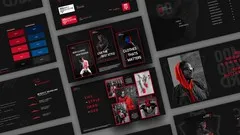
Brand Management: Aligning Business Brand and Behaviour 
This course, led by Professor Nader Tavassoli of London Business School, provides an in-depth look at brand management, exploring how to align business, brand and behaviour. Through brand workouts and guest videos from leading branding professionals, participants will gain a comprehensive understanding of how to create a successful brand. ▼
ADVERTISEMENT
Course Feature
![]() Cost:
Cost:
Free
![]() Provider:
Provider:
Coursera
![]() Certificate:
Certificate:
Paid Certification
![]() Language:
Language:
English
![]() Start Date:
Start Date:
3rd Jul, 2023
Course Overview
❗The content presented here is sourced directly from Coursera platform. For comprehensive course details, including enrollment information, simply click on the 'Go to class' link on our website.
Updated in [March 06th, 2023]
Professor Nader Tavassoli of London Business School offers a course on Brand Management: Aligning Business Brand and Behaviour. This course provides an overview of traditional approaches to branding, where brands are a visual identity and a promise to customers, and how to shift to brands as a customer experience delivered by the entire organisation. Through this course, students will gain a deeper understanding of the evolving practice of brand management, be motivated to engage in delivering their own brands, and learn how to translate learnings into action.
The course will cover topics such as how to build brands from a broad organisational perspective, how to lead brand-led culture change with human resource practices at the core, how to build brands in multi-brand companies, across cultures and geographies, how to measure brand health in new ways, and how to value and capture returns to brands across the organisation. Additionally, the course will feature guest videos from leading branding professionals.
By the end of the course, students will have a better understanding of the concept of brands as a customer experience delivered by the entire organisation, and how to lead brand-led culture change with human resource practices at the core.
[Applications]
Upon completion of this course, participants are encouraged to apply the knowledge and skills acquired to their own brands. This includes developing a broad organisational perspective on brand management, leading brand-led culture change, building brands in multi-brand companies, measuring brand health, and valuing and capturing returns to brands across the organisation. Participants should also strive to engage in delivering their own brands, thereby creating superior value for customers and for their organisation.
[Career Paths]
Recommended Career Paths:
1. Brand Manager: Brand Managers are responsible for developing and managing the overall brand strategy for an organization. They are responsible for creating and executing marketing campaigns, developing and managing brand partnerships, and ensuring that the brand is represented consistently across all channels. Brand Managers must have a deep understanding of the target audience and be able to develop creative strategies to engage them. As the role of the Brand Manager evolves, they must also be able to leverage data and analytics to inform their decisions.
2. Brand Strategist: Brand Strategists are responsible for developing and implementing long-term strategies for an organization’s brand. They must have a deep understanding of the target audience and be able to develop creative strategies to engage them. Brand Strategists must also be able to leverage data and analytics to inform their decisions. They must be able to develop and execute campaigns that are both creative and effective.
3. Brand Experience Designer: Brand Experience Designers are responsible for creating engaging experiences for customers that are both memorable and effective. They must have a deep understanding of the target audience and be able to develop creative strategies to engage them. Brand Experience Designers must also be able to leverage data and analytics to inform their decisions. They must be able to develop and execute campaigns that are both creative and effective.
4. Brand Activation Manager: Brand Activation Managers are responsible for developing and executing campaigns that bring the brand to life. They must have a deep understanding of the target audience and be able to develop creative strategies to engage them. Brand Activation Managers must also be able to leverage data and analytics to inform their decisions. They must be able to develop and execute campaigns that are both creative and effective.
[Education Paths]
Recommended Degree Paths:
1. Bachelor of Business Administration (BBA) in Brand Management: This degree program provides students with the knowledge and skills needed to develop, manage, and evaluate brands. Students will learn how to create and maintain a brand identity, develop marketing strategies, and analyze customer data. Additionally, they will gain an understanding of the legal and ethical considerations of brand management. This degree is ideal for those interested in pursuing a career in marketing, advertising, or public relations.
2. Master of Science (MS) in Brand Management: This degree program provides students with an in-depth understanding of the principles and practices of brand management. Students will learn how to create and maintain a brand identity, develop marketing strategies, and analyze customer data. Additionally, they will gain an understanding of the legal and ethical considerations of brand management. This degree is ideal for those interested in pursuing a career in marketing, advertising, or public relations.
3. Master of Business Administration (MBA) in Brand Management: This degree program provides students with the knowledge and skills needed to develop, manage, and evaluate brands. Students will learn how to create and maintain a brand identity, develop marketing strategies, and analyze customer data. Additionally, they will gain an understanding of the legal and ethical considerations of brand management. This degree is ideal for those interested in pursuing a career in marketing, advertising, or public relations.
4. Doctor of Philosophy (PhD) in Brand Management: This degree program provides students with an in-depth understanding of the principles and practices of brand management. Students will learn how to create and maintain a brand identity, develop marketing strategies, and analyze customer data. Additionally, they will gain an understanding of the legal and ethical considerations of brand management. This degree is ideal for those interested in pursuing a career in marketing, advertising, or public relations.
Developing Trends:
1. Digital Branding: Digital branding is becoming increasingly important in the world of brand management. As technology advances, companies are using digital platforms to reach their target audiences and build relationships with them. Digital branding involves creating content, engaging with customers, and leveraging data to create personalized experiences.
2. Social Media Branding: Social media is a powerful tool for brand management. Companies are using social media to build relationships with their customers, create content, and engage with their target audiences. Social media branding involves creating content, engaging with customers, and leveraging data to create personalized experiences.
3. Brand Storytelling: Brand storytelling is an important part of brand management. Companies are using stories to create an emotional connection with their customers and build relationships with them. Brand storytelling involves creating content, engaging with customers, and leveraging data to create personalized experiences.
4. Brand Activation: Brand activation is becoming increasingly important in the world of brand management. Companies are using brand activation to create an emotional connection with their customers and build relationships with them. Brand activation involves creating content, engaging with customers, and leveraging data to create personalized experiences.
Course Syllabus
Brand Purpose & Experience
Welcome to Module 1! In this module, we'll cover the following topics: Traditional notions of branding; Changing market conditions for brands; A new approach to branding. As well as the lecture videos, you will also be learning through interviews with brand practitioners such as Bethany Koby, Director of Technology Will Save us and David Kershaw, CEO of M&C Saatchi. There are optional readings to supplement your understanding, a quiz with 7 questions to test your learning and a peer review assignment based on a task connected to this module.Brand Design & Delivery
Welcome to Module 2! In this module, we'll cover the following topics:Brand experiences as the basis for differentiation; How to design brand experiences, as different from products and services; Pricing as a differentiating brand experience. As well as the lecture videos, you will also be learning through interviews with brand practitioner Hub van Bockel, an independent consultant and author and with Professor Bernd H. Schmitt of Columbia Business School. There are optional readings to supplement your understanding, a quiz with 6 questions to test your learning and a peer review assignment based on a task connected to this module.Brand Leadership and Alignment
Welcome to Module 3! In this module, we'll cover the following topics: Aligning the strategies for business, brand and behaviour; Strategic brand portfolio alignment; Delivering global brand alignment. As well as the lecture videos, you will also be learning through interviews with practitioners, Ije Nwokorie, CEO of Wolff Olins, Helen Casey and Henk Viljoen, both of Old Mutual and Keith Weed, CMO of Unilever. There are optional readings to supplement your understanding, a quiz with 7 questions to test your learning and a peer review assignment based on a task connected to this module.Brand Practices & Engagement
Welcome to Module 4! In this module, we'll cover the following topics:How to design human resource brand best-practices; A model for engaging employees with the brand; The ABCs of behavioural change. As well as the lecture videos, you will also be learning through interviews with practitioners Helen Edwards of Passionbrand, Richard Hytner of Saatchi & Saatchi, Tanya Truman and Nik Allebon of Lush. There are optional readings to supplement your understanding, a quiz with 5 questions to test your learning and a peer review assignment based on a task connected to this module.Brand Metrics & Returns
Welcome to Module 5! In this module, we'll cover the following topics: How brands create value; Why brand valuation is not the same as the value brands create; How to design a strategic and cross-functional brand dashboard. As well as the lecture videos, you will also be learning through interviews with David Haigh, CEO of Brand Finance. There are optional readings to supplement your understanding, a quiz with 6 questions to test your learning and a peer review assignment which asks you to reflect on your learning throughout the course.Pros & Cons

Interesting case studies and interviews.

Friendly instructor.

Good takeaways.

Too basic for experienced learners.

Repetitive in some aspects.

Lack of theoretical concepts.
Course Provider

Provider Coursera's Stats at AZClass
Discussion and Reviews
0.0 (Based on 0 reviews)
Explore Similar Online Courses

Quantum Mechanics of Molecular Structures

Wordpress Tutorial For Beginners to get started in Wordpress

Python for Informatics: Exploring Information

Social Network Analysis

Introduction to Systematic Review and Meta-Analysis

The Analytics Edge

DCO042 - Python For Informatics

Causal Diagrams: Draw Your Assumptions Before Your Conclusions

Whole genome sequencing of bacterial genomes - tools and applications

Branding Success Ultimate 2018 Branding Yourself Materclass

How To Build A Super Brand

Design a brand style guide The Entire Brand Design Process
 Related Categories
Related Categories
 Popular Providers
Popular Providers
Quiz
 Submitted Sucessfully
Submitted Sucessfully
1. What is the aim of the course?
2. What is the new concept of employee-based brand equity?
3. What does Confucius say about learning?


Start your review of Brand Management: Aligning Business Brand and Behaviour